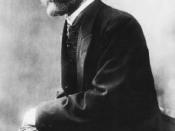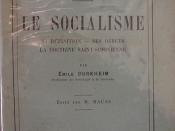Knowledge, as defined by the Webster's Encyclopedic Unabridged Dictionary is the "acquaintance with facts, truths or principles. " When using this definition to determine a Marxian and Durkheimian theory of knowledge, one must break it down into it's three themes and analyze them separately. Durkheim deems religion indispensable for the procurement of knowledge and sees religion as essential to the function of society. Marx argues that knowledge is restricted by religion, and religion oppresses its followers with a false sense of hope. This essay will further explore their diverse perceptions of the theory of knowledge through its intimate and arguably indispensable or detrimental ties to religion.
Marx believes that the individual understands the facts of his/her life, but is too numbed by false hope to be able change them. If according to Marx, what one does is more important than what one thinks, when one is only thinking about their personal suffering, they are subsequently not doing anything about it.
By not acting upon one's own ideas, there remains the only option of following the lead of others. When one's consciousness is governed by one's being, and the individual in question is but a mere follower for not acting upon his own ideas, would this not incite Marx's view of knowledge as being controlled by the group, and restricted by religion; as following is the essence of religion? When Marx stated that he despised all Gods, as they "do not recognize man's self-consciousness as the highest of divinity," he implies that religion makes one cravenly submissive to the acceptance without question of their status quo. He believes that religion takes away all that is venerable in humans, forcing one to accept generalized facts of our society, leaving a bitter taste of despair and a false hope for...


